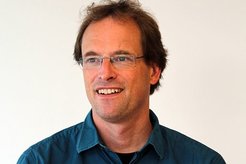Markus Reichstein receives Gottfried Wilhelm Leibniz Prize

Quite surprisingly, Markus Reichstein received the announcement from the German Research Foundation that he is one of the winners of the Gottfried Wilhelm Leibniz Prize 2020 in the late morning.
„It was a good coincidence that we were sitting in a scientific meeting that dealt precisely with these topics, for which I was honored when the news reached me - fortunately, I still had a bottle of sparkling wine in my office that we could immediately uncork", the prizewinner said happily.
Markus Reichstein is one of the world's leading scientists in the field of ecosystem response and impact on climate change. He is particularly interested in the carbon and water cycles and how these are influenced by vegetation and soil processes where his group achieved groundbreaking progress in combining global data from measuring towers and their further processing together with other data, for example from remote sensing. This has led to the development of models with which the exchange between the land surface and the atmosphere can be extrapolated from local to global scales. With this approach, which was the initial use of artificial intelligence in this context, Reichstein and his colleagues were able to publish for the first time global estimates of plant photosynthesis and current trends in global water evaporation. This also enabled them to show the importance of the water cycle and extreme weather events for the global carbon cycle in the Earth system.
„I also see the award as an acknowledgement of Earth System Science as a whole, which has become more than just climate science and, as a young branch of research, is now at least on an equal level with more classical sciences. The Earth and Solar System partnership of the Max Planck Society with institutes in Mainz, Hamburg, Göttingen and Jena has certainly contributed to its visibility“, emphasizes Reichstein.
Beside his function as Managing Director and Head of the Department of Biogeochemical Integration at the Max Planck Institute for Biogeochemistry, Reichstein is a member of the Thuringian State Science Conference, the Climate Council of Thuringia and the German Committee for Sustainability Research in Future Earth. There, he is spokesman of the working group on social resilience and climate extremes. Since 2014 he has been Professor for global geo-ecology at the Friedrich Schiller University Jena and he was co-founder of the Michael Stifel Center for Data and Simulation Sciences Jena (MSCJ). Despite his many research and coordination tasks, Markus Reichstein still finds time to give lectures on climate change and extreme events in public and in schools.
In 2013 Markus Reichstein received the renowned Max Planck Research Award for his research on the impact of climate change on ecosystems and in 2018 he was awarded the Piers J. Sellers Prize in the Global Environmental Change Section of the American Geophysical Union (AGU).
With the award of the most important German research prize, he is now honored with the highest recognition for his outstanding research achievements in Germany.
The Gottfried Wilhelm Leibniz Prize is the most important research award in Germany. The Leibniz Programme, which was established in 1985, aims to improve the working conditions of outstanding scientists, expand their research opportunities and relieve them of administrative work. The prize is endowed with up to 2.5 million euros. Funding will only be granted on the recommendation of a third party, whereby the decision on the award winners is made by the Joint Committee following a recommendation of the Selection Committee.
Out of 114 proposals the prize goes to ten scientists, four from the humanities and social sciences, three from the life sciences, one from the natural sciences and two from the engineering sciences. The award ceremony for the Leibniz Prizes by the DFG will take place on 16 March 2020 in Berlin.
Markus Reichstein has been head of the 'Biogeochemical Integration' department at the Max Planck Institute for Biogeochemistry in Jena since 2012. He was born on 25 September 1972 in Kiel, studied landscape ecology, botany, chemistry and computer science at the University of Münster and received his doctorate in 2001 from the University of Bayreuth. Until 2003 he worked in the Department of Plant Ecology at the University of Bayreuth. After spending time at the Universities of Tuscia (Italy), Montana (Missoula, USA) and California (Berkeley, USA) between 2003 and 2006, he managed a Max Planck research group at the Max Planck Institute for Biogeochemistry between 2006 and 2012.
Contact
Markus Reichstein
Department Biogeochemical Integration
Max-Planck-Institute for Biogeochemistry
Hans-Knöll-Str. 10, 07745 Jena, Germany
phone: +49 3641 576200
e-mail: markus.reichstein@bgc-jena.mpg.de
